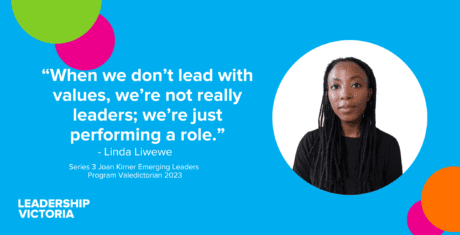By Oenone Serle, LV Facilitator
One of the most inspiring parts of the recent Positive Psychology World Conference in Melbourne, was a whole day on the topic of ‘Thriving Women Thriving World’. It was a thrill to collaborate and learn with women from around the world, finishing the day with sharing promises of what we would do to help women and the world thrive. I’d like to share some of the takeaways.
You may have heard of the facilitators Diana Whitney, author and global leader on Appreciative Inquiry methodology, and Caroline Adams Miller, speaker, author and educator on goal-setting and grit (Caroline’s book Getting Grit, is well worth a read). Mobilised by the #MeToo movement, Diana and Caroline crafted the first-ever Appreciative Inquiry Summit on ‘Thriving Women, Thriving World’.
What is Appreciative Inquiry?
Appreciative Inquiry is a model that seeks to engage stakeholders in self-determined change. It’s an approach to change which focuses on individual and collective strengths, hopes and dreams for the future, rather than on problems and weaknesses.
From the multiple stories that were shared in the discovery phase discussion, the five enablers to women thriving were summarised as:
- Relationship with self
- Encouragement and support
- Community and connection
- Purpose and challenge
- Grit and perseverance
During the Designing phase, innovative positive changes in the areas of economics, politics, work, leadership, relationships, body image, media and community were put forward to create a thriving world of thriving women. There was a reminder to encourage and support women through Active Constructive Responding.
What is Active Constructive Responding?
Active Constructive Responding is a type of response where people share news about things going well. Responses can be categorised along two dimensions: constructive – destructive and active – passive and thus differentiated into four types of response:
- active – constructive (e.g. enthusiastic support)
- passive – constructive (e.g. quiet, understated support)
- active – destructive (e.g. demeaning the event)
- passive – destructive responses (e.g. ignoring the event)
Want to understand more about these four types of responses? Watch this video.
Relationships strengthen when we share good news and receive support showing enthusiasm and curiosity through active constructive responses. Only the active constructive type of responding plays a part in building relationships because it is directly linked with commitment, satisfaction, intimacy, and trust (Gable et al., 2004). It conveys responsiveness to self, and the message that I am understood, I am validated.
Caroline reminded us of this in the context of what we can do to help women thrive. When woman share their hopes and successes, we need to support and encourage them, not be ‘frenemies’. The people around us matter, so look for those who respond in an ‘active constructive’ way and avoid the rest.
Leadership of Thriving Women
It’s important to apply this concept to leadership and gender equality. When a woman comes to tell you about her promotion, her hopes, her initiatives, her achievements, her steps to learn something new, we can choose to be present and respond in an ‘active constructive’ way.
‘Active constructive’ responses build strong women, relationships and networks. They show encouragement and support, and help build self-esteem and confidence. This is a simple way to help gender equality and to support women to thrive. We can lead with our words.
Broader learnings in the area of thriving women and leadership, focused on suggestions for practical actions in support for mental health and wellbeing, reconsideration of domestic responsibilities, working on organisational structures, systems and culture, getting 50/50 ratio of women in higher positions and politics, gaining clarity and normalising what feminine leadership looks like and unbiased selection processes.
Each woman who attended left with a promise to take one action. Mine involved mentoring a migrant woman. You may well be interested to do something similar.
Additional Resources
- Read: the book, Thriving Women, Thriving World, which provides useful tools for continuing this conversation.
- Listen: If you would like to hear Diana Whitney speak on this work, listen here.
Oenone Serle, LV Senior Facilitator
Oenone is a leadership specialist, learning designer and facilitator with over twenty-five years’ experience mainly in the private and not-for-profit sectors. Over the past three years as a Senior Facilitator with Leadership Victoria she has loved the connection, learning and network-building that emerges from leadership programs.
Her aim is to support individuals and organisations to achieve their potential, to celebrate diversity, and to focus on creating enduring positive social and business impact. Oenone’s top strength is curiosity. She is a keen lifelong learner, a trained yoga instructor and enjoys bush-walking, bike-riding and building social cohesion.
Oenone brings a strength focus and passion for research on positive organisations to her leadership work. She has a Masters of Applied Positive Psychology.
Women’s Leadership Program
Oenone is the facilitator of LV’s Women’s Leadership Program taking place in September 2020. Early bird enrolments are currently open so don’t miss out on your chance to hear from Oenone and other inspiring motivational speakers who will empower you to reach your leadership potential.




